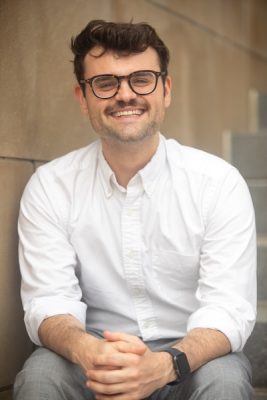In May 2025, Syracuse University School of Education said “farewell” to Nick Piato G’22 after three years as program coordinator for The SENSES Project, which seeks to increase sense of belonging for students through the use of music and podcast creation. SENSES is an initiative of the TRIO Student Support Services program, part of SOE’s Center for Academic Achievement and Student Development.
 A graduate of the Master of Science program in Music Education, Piato is currently studying for a Ph.D. in Music Education from Northwestern University in Evanston, IL.
A graduate of the Master of Science program in Music Education, Piato is currently studying for a Ph.D. in Music Education from Northwestern University in Evanston, IL.
PAST: What memory from your time at SOE do you most cherish?
One of my favorite aspects of the music education master’s program was the colleagues I got to study alongside. I remain close with a number of students who went through the program, and we still get together to talk about how our teaching journeys are going and to bounce ideas off each other.
I also met a number of professors in the program who have continued to act as mentors for me over the past few years in higher education. I was extremely proud to take many of the lessons I learned while studying at Syracuse and apply them to help facilitate The SENSES Project.
In the past three years, SENSES has released seven collaborative albums, assisted on countless individual songs, and taught guitar, music production, DJing, and other instruments to countless students. It brought me immense joy to be a part of this hub of creativity and community on campus.
PRESENT: What are you working on now that you’d like to share with fellow alums?
“I believe that popular music education offers avenues for increasing intrinsic motivation, cross-curricular learning, cultural relevancy, and a host of other benefits.”
Currently, I am about to begin my studies at Northwestern University for a Ph.D. in music education. I intend to focus on how the growing field of popular music education can have positive outcomes for students, educators, and communities, particularly within public K-12 schools. I am also interested in looking at the intersections of labor, education, and music.
Aside from studying music, I also hope to continue creating it. My creative interests vary from songwriting to hip-hop production to DJing, and I hope to bring a multi-modal approach to my research.
FUTURE: What is your hope for the future of education and learning?
While today’s students listen and engage with predominantly popular music genres, our music curriculum, pedagogy, and language continue to center classical and, occasionally, jazz music. I believe that popular music education offers avenues for increasing intrinsic motivation, cross-curricular learning, cultural relevancy, and a host of other benefits.
I also hope that music education spaces focus less on re-creation (that is, being training grounds for a dwindling number of bands, orchestras, and choruses) and more on creation (student-led songwriting, collaborative albums, planning and carrying out live shows, etc.) I believe this approach could lead to an increase in citizens who consider themselves life-long music creators; ones who are able to engage with the music they actually listen to in a critical and engaged way.
